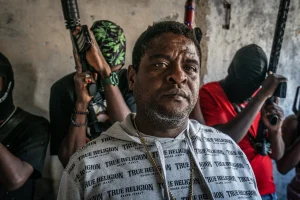While searching around on the internet, I found this beautiful article from Haitian American Lawyer Olga Statz, who is currently running for New York Civil Court 3rd District , but instead of writing about her race to office, I was more intrigued with her uplifting story of the love & appreciation she has for her Haitian father, who she refer to as her hero.
I am staggered by my good fortune. God saw fit to give me my very own Hero.
My hero doesn’t wear a cape, and he doesn’t fly, but that is his strength—he is there, always there when and where you need him, and is never flitting about. He eschews the flapping piece of fabric in favor of well-cut suits. Kryptonite doesn’t bother him, but he won’t eat soup. And like his TV twin, he jumps over tall obstacles in a single bound.
Throughout my life, he has jumped over monumental piles of ignorance with a single leap of phrase.
Take for instance the time he told me I wasn’t put on this earth to be anyone’s victim. I was a teenager. I had been crying over some unpleasant boy experience. I was going full-throttle when he looked up from his paper and said, in his laconic way, “You do know, don’t you, that you were not put on this earth to be anyone’s slave or victim. You shouldn’t let anyone treat you disrespectfully.”
My tears came to a screeching halt, like tires on a road. My mouth dropped open as I looked at him. What was he telling me? Did he just say I had a choice whether to accept or not to accept bad treatment? But I thought that suffering and then bemoaning that suffering was part of my womanly birthright—that’s what the soap operas and fashion magazines said at least. Could it be that they were wrong? He had said his peace and quickly lost interest. He resumed his affair with The New York Times as I sat there with my life upside down and my tears in suspense.
Then there was the other time, a time when I was a bit younger, perhaps 12 or 13, and I announced that I would marry early and live in a suburb like the people in the car commercial I was watching. I was fascinated by that peck on the lips the well-groomed housewife gave the husband as he walked out of the house in the morning. “That is what I want to do.”
He bent the corner of his ubiquitous paper and looking over his glasses said simply, “If I were you, I’d concentrate on my studies and on getting a profession. That prince of yours might give you four kids and then leave you for a woman with bigger breasts. Then what would you do?” Again, my mouth dropped open, and his reading was resumed without further comment.
As you probably figured out, my dad doesn’t say much, and whatever he does say is usually from behind the paper.
In his own grouchy, silent way, he was extremely attentive when I was a child. Every two weeks, when he was paid, he took me to a Cuban Chinese restaurant in our neighborhood called Victoria China, which for me was the very height of luxury living. As I ate my spare ribs and egg roll and drank my orange soda, he sat across from me, behind the paper, of course, sipping his café con leche. As I ate, his hand occasionally reached for the coffee cup. The cup would disappear behind the paper for a few moments and then be placed back into the waiting saucer. He obviously had not read any of those books about engaging your child in constant conversation and lavishing them with showy attentions. I was pretty happy with the arrangement, however, as it allowed me to gnaw on the rib bones in peace, something impossible to do when my mom was around (she, by the way, is a character, in her own right).
In the winter, he took me ice skating in Rockefeller Center. He waited, alone and cold, among the spectators as I whirled around in my little red skating skirt and fluffy white fake fur hat with the pom-pom ties under the chin. He wore neither hat nor gloves. I suppose he thought that they were for sissies and that real men should brave the cold armed only with their mustaches and their cups of coffee.
And in the summer, he drove us to Rockaway beach in our blue Buick with the vinyl seats. His polo shirt buttoned to his chin, he would sit under a tree and read a magazine and wait until my mother, cousin, aunt and I finished splashing in the water.
My parents moved to New York to escape Duvalier. They were part of the great exodus of the middle and professional classes from Haiti in the late 1950s early ’60s. The statistics are astounding: In 1964, I think there were more Haitian doctors in Canada than there were in Haiti. By the time I was old enough to understand my surroundings, my dad was working a white collar job as a social worker, but before then, when he first came, he accepted any job he could find. At one point, my father, who had been a lawyer in Haiti, worked by day as a janitor, by night as an orderly, and on Saturdays at a car wash. Once, in a fit of youthful stupidity, I asked him why he had worked so many jobs. He answered simply, “You needed food.”
His lessons have stood me in good stead throughout my life. My parents taught me the value of work, common sense, duties fulfilled, and self-pity murdered in its crib, stifled at its source, because it offends our dignity and is a waste of time. This Thanksgiving, I lift my glass to my parents, but in particular to my dad, my beautiful Black dad. Long may he prosper.
































